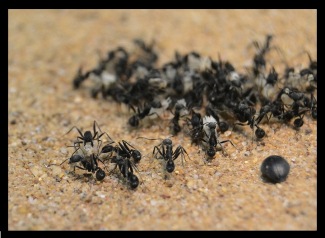Social factors in ants

In social insects, only one or a few individuals of a colony mate and reproduce. The production of reproductive queens and non-reproductive workers arises from a developmental switch at the larval stage, and is generally regulated by environmental factors. Workers are expected to influence the production of both caste through the control of larval development.
Kin selection theory predicts that the current queen, the workers and the larvae have increasing interest in the production of new queens, suggesting potential intracolonial conflicts. These conflicts are likely resolved by signalling the presence of a mated queen. Pheromones are generally involved in conflict resolution, but their chemical nature and effects are largely elusive.
The present thesis aims at characterizing the social factors regulating caste differentiation in ant colonies. We investigated behavioural, physiological and pheromonal mechanisms that influence the production of queens. The monogynous ant Aphaenogaster senilis provides a useful model. The queen prevents the production of new queens by mean of pheromonal communication. However, if she disappears, a few replacement queens are reared from the totipotent diploid larvae.
Overall, our results confirmed that the workers and the queen constrain colonial reproductive decisions. In chapter two, we showed that the production of queens correlated with the number of workers. Larval fate depended on the realization of food processing tasks by the workers at the group level. The third and fourth chapters confirmed that the mated queen fully inhibit the development of larvae toward queens. She signals her caste and mating status.
Chapters three, four and five pointed at cuticular dimethylalkanes, and especially two queen-specific dimethylalkanes, as good candidates for the queen signal. These results contribute to substantial amount of works showing the important role of cuticular hydrocarbons in queen-worker communication. The third chapter asked for the transmission of the queen pheromones. We showed that queen-laid eggs do not transmit queen primer pheromones.
Chapter four investigated the role of queen’s behaviour to maintain their reproductive monopoly. We conclude that collective decision-making over the production of sexuals is mainly shaped by the presence and reproductive state of one individual, the queen.
References
"Effect of social factors on caste differentiation in the ant Aphaenogaster senilis", Camille Ruel's doctoral thesis thesis doctoral read at the CREAF in the UAB, made at the Estación Biológica de Doñana (CSIC) and supervised by Xim Cerdá y Raphaël Boulay.

